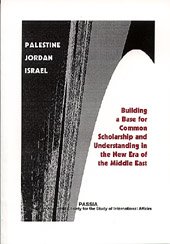Palestine-Jordan-Israel: Building A Base for Common Scholarship and Understanding in the New Era of the Middle East
The three players at the heart of the transformation process the Middle East is undergoing are Palestine, Jordan and Israel, yet despite the importance of internationally applauded agreements reached between them during 1993 and 1994, the real process of achieving durable peace among the people has only just begun. There are many obstacles that could prevent the peace process from reaching the conclusions broadly aspired to: moreover, misunderstandings and mistrust generated by decades of conflict still exist in the general outlook of each of the societies involved.
Against this background, three institutes - PASSIA, the Center for Strategic Studies (Amman) and the Moshe Dayan Center (Tel Aviv) embarked on a joint project to contribute to resolving differences by pooling their resources, knowledge and expertise. Through a program of dialogue and workshops, the aim was to promote understanding regarding their separate identities and existence, their histories and their relationship to others in the region. The proceedings of those trilateral sessions are contained in this book.
Introduction
I. Domestic Constraints on the Middle East Negotiations
* Domestic Constraints on the Middle East Negotiations -
A Palestinian Perspective
Dr. Mahdi Abdul Hadi
* Domestic Constraints on the Middle East Negotiations -
A Jordanian Perspective
Dr. Mustafa Hamarneh
* Internal Constraints on the Arab-Israeli Peace Process -
An Israeli View
Dr. Yochanan Peres.
II. The Opposition and Its Role in the Peace Process
* The Opposition and Its Role in the Peace Process -
A Palestinian Perspective
Dr. Riad Malki
* The Opposition and Its Role in the Peace Process -
A Jordanian View
Dr. Mustafa Hamarneh
* Israel’s Political Parties and the Peace Process
Prof. Ephraim Yuchtman-Yaar
III. Religion and State
* Features of the Governing System in Islam
Sheikh Jamil Hamami
* The Relationship Between Church and State:
A Christian Point of View
Dr. Giries S. Khoury
* State and Religion in Jordan
Dr. Musa Shteiwi
* Religion and State in Israel
Dr. Benyamin Neuberger
IV. Economics and Demography
* Demography, Economic Growth and Job Creation in the West Bank and Gaza Strip
Dr. Osama Hamed
* Demographic Conditions and the Jordanian Economy
Mr. Hani Hourani
* The Israeli Economy
Dr. Paul Rivlin
V. State-Building, Identity, Pluralism and Participation
* Identity, Pluralism and the Palestinian Experience
Dr. Mahdi Abdul Hadi
* State-Building, Identity, Pluralism & Participation in Jordan
Dr. Mustafa Hamarneh
* From ‘State Within State’ to State
Dr. David Vital
VI. Palestine, Israel and Jordan in the Middle East
Palestine in the Middle East
Dr. Khalil Shikaki
Jordan in the Middle East
Dr. Mustafa Hamarneh
Israel’s Place in the Region
Dr. Asher Susser
VII. Government and Civil Society
* Government and Civil Society in Palestine
Dr. Salim Tamari
* Government and Civil Society in Jordan
Dr. Sabri Rbeihat
* Israel’s State and Civil Society after 50 Years of Independence
Dr. Yossi Shain
VIII. Political Trends and the New Elites
* Political Trends and the New Elites in Palestine
Dr. Bernard Sabella
* Partisan Leadership and Electoral Laws:
The Israeli Domain in Context
Dr. Gad Barzilai

